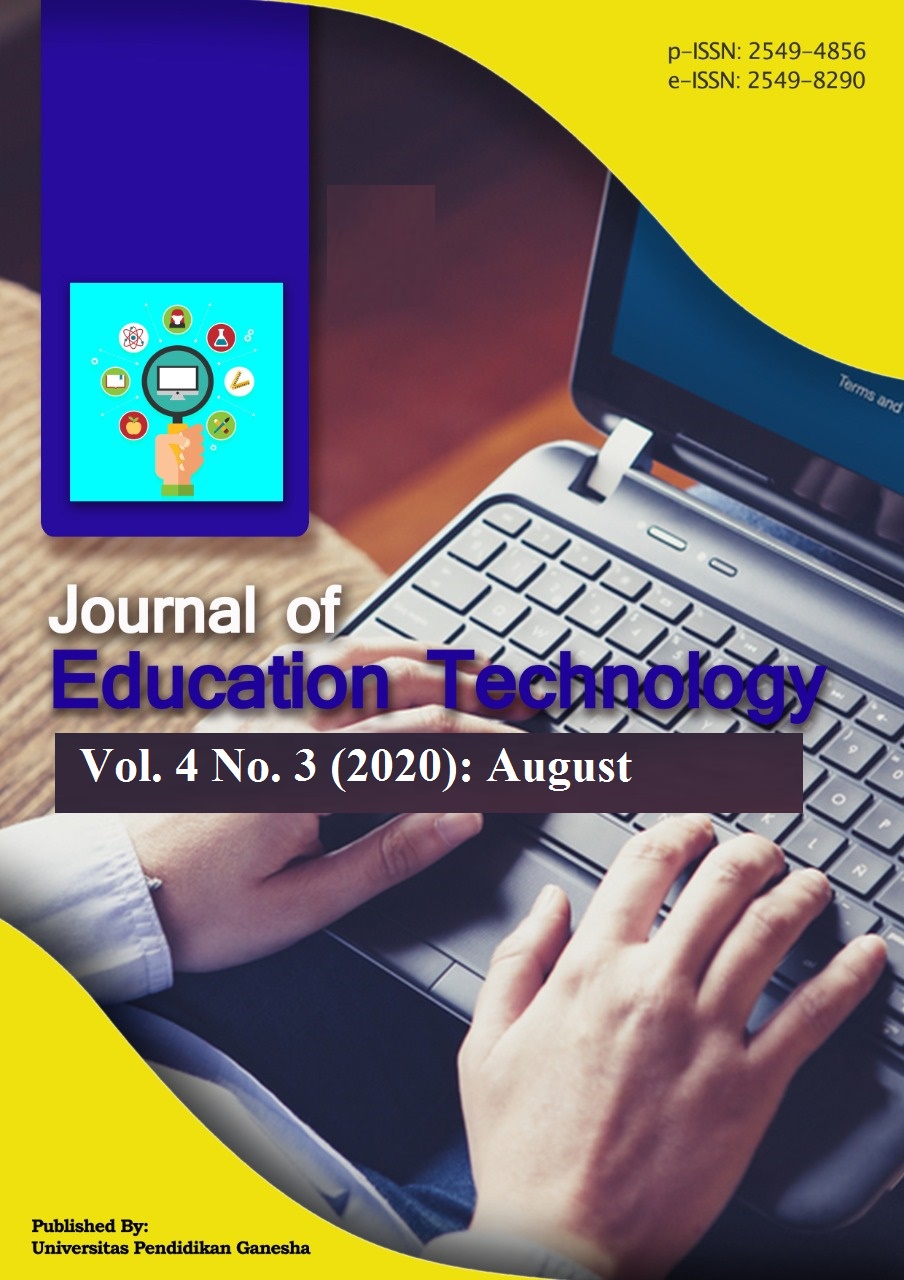Development of Mobile Learning for Simulation and Digital Communications
DOI:
https://doi.org/10.23887/jet.v4i3.28537Abstract
Simulation and digital communication subjects at SMKN 1 Singkarak do not have support other than text books and modules. This study aimed to develop a practical and effective learning platform that can support students in learning. This study used a 4D development model, and the trial subjects in this study were 31 students of class X in the 2020/2021 academic year. The instruments used were test and questionnaire instruments. The research method used was pre-experimental. The data obtained were analyzed using quantitative descriptive statistical analysis methods. From the research results, it was found that classical completeness reached 90% and the average score in terms of the gain score of students before and after using mobile learning was 0.49. The conclusion of this research is that the results of assessments from both teachers and students show that mobile learning in simulation and digital communication subjects can be categorized as very practical and effective
References
Akmal, H., & Susanto, H. (2018). Efektivitas Penggunaan Aplikasi Pembelajaran Berbasis Mobile Smartphone Sebagai Media Pengenalan Sejarah Lokal Masa Revolusi Fisik Di Kalimantan Selatan Pada Siswa Sekolah Menengah Atas. Jurnal HISTORIA, 6(2), 197–206.
Cecep, C., Mutaqin, A., & Pamungkas, A. S. (2019). Pengembangan Modul Quick Math Berbasis Mobile Learning sebagai Penunjang Pembelajaran Matematika di SMA. Prisma Sains: Jurnal Pengkajian Ilmu Dan Pembelajaran Matematika Dan IPA IKIP Mataram, 7(2), 148–159. https://doi.org/10.33394/j-ps.v0i0.1761
Efriyanti, L., & Annas, F. (2020). Aplikasi Mobile Learning Sebagai Sarana Pembelajaran Abad 21 Pada Era Revolusi Industri 4.0. JURNAL EDUCATIVE: Journal of Educational Studies, 5(1), 1–40. https://doi.org/http://dx.doi.org/10.30983/educative.v5i1.3132
El-Hussein, M. O. M., & Cronje, J. C. (2010). Defining Mobile Learning in the Higher Education Landscape. Educational Technology & Society, 13(3), 12–21.
Hardinata, R., Murwitaningsih, S., & Amirullah, G. (2018). Pengembangan Mobile Learning Sistem Koordinasi Berbasis Android. Bioeduscience, 2(1), 53–58. https://doi.org/10.29405/j.bes/53-58121334
Ibrahim, N., & Ishartiwi, I. (2017). Pengembangan Media Pembelajaran Mobile Learning Berbasis Android Mata Pelajaran IPA Untuk Siswa SMP. Refleksi Edukatika : Jurnal Ilmiah Kependidikan, 8(1), 80–88. https://doi.org/10.24176/re.v8i1.1792
Jinot, B. L. (2019). An Evaluation of a Key Innovation: Mobile Learning. Academic Journal of Interdisciplinary Studies, 8(2), 39–45.
Juniarti, Y., & Gustiana, E. (2019). Pengembangan Sunber Belajar Bermain Berbasis Mobile Learning. JPE (Jurnal Pendidikan Edutama), 6(1), 37–42. https://doi.org/http://dx.doi.org/10.30734/jpe.v6i1.289
Kasatria, R. J. (2014). Pengembangan Teknologi Informasi Mobile Learning Fakultas Teknik Universitas Diponegoro Berbasis Android. Jurnal Teknologi Dan Sistem Komputer, 2(4), 241–248. https://doi.org/https://doi.org/10.14710/jtsiskom.2.4.2014.241-248
Khomarudin, A. N., Efriyanti, L., & Tafsir, M. (2018). Pengembangan Media Pembelajaran Mobile Learning Berbasis Android Pada Mata Kuliah Kecerdasan Buatan. Journal Educative : Journal of Educational Studies, 3(1), 72–87. https://doi.org/10.30983/educative.v3i1.543
Listyorini, T., & Widodo, A. (2013). Perancangan Mobile Learning Mata Kuliah Sistem Operasi Berbasis Android. Jurnal SIMETRIS, 3(1), 25–30. https://doi.org/10.1017/CBO9781107415324.004
Mu’min, U. A. (2019). Peran Teknologi Informasi Dalam Bidang Pendidikan (E-education). Al-Afkar, Journal for Islamic Studies, 2(1), 104–119. https://doi.org/10.31219/osf.io/ycfa2
Pratama, R. A., Ulfa, S., & Kuswandi, D. (2018). Mobile Learning Berbasis Game Based Learning Pelajaran Matematika Pokok Bahasan Bangun Ruang Sisi Datar. Jurnal Pendidikan: Teori, Penelitian, Dan Pengembangan, 3(6), 771–777. https://doi.org/http://dx.doi.org/10.17977/jptpp.v3i6.11167
Purbasari, I., Ismaya, E. A., Suryani, N., & Djono. (2019). Media Pembelajaran Ilmu Pengetahuan Sosial Berbasis Aplikasi Mobile Learning bagi Siswa Sekolah Dasar. Sejarah, Budaya Dan Pengajaran, 2015, 97–106. https://doi.org/10.17977/um020v13i12019p97
Rasyid, A., Gaffar, A. A., & Utari, W. (2020). Efektivitas Aplikasi Mobile Learning Role Play Games (RPG) Maker Mv Untuk Meningkatkan Kemampuan Berpikir Kritis. Jurnal Mangifera Edu, 4(2), 107–115.
Setyadi, D. (2017). Pengembangan Mobile Learning Berbasis Android Sebagai Sarana Berlatih Mengerjakan Soal Matematika. Satya Widya, 33(2), 87–92. https://doi.org/10.24246/j.sw.2017.v33.i2.p87-92
Suryanda, A., Ernawati, E., & Maulana, A. (2018). Pengembangan Modul Multimedia Mobile Learning Dengan Android Studio 4.1 Materi Keanekaragaman Hayati Bagi Siswa Sma Kelas X. Biosfer: Jurnal Pendidikan Biologi, 9(1), 55–64. https://doi.org/10.21009/biosferjpb.9-1.9
Syahbani, M. H., & Rosmansyah, Y. (2017). Pengembangan Mobile Collaborative Learning System Menggunakan Kerangka Kerja Zachman dan DICE. Jurnal Informatika: Jurnal Pengembangan IT Poltek Tegal, 2(2), 47–52. http://ejournal.poltektegal.ac.id/index.php/informatika/article/view/515
Taufiq, M., & Amalia, A. V. (2017). the Development of Science Mobile Learning With Conservation Vision Based on Android App Inventor 2. Unnes Science Education Journal, 6(1), 1472–1479. https://doi.org/10.15294/usej.v6i1.13179
Wulandari, D. A., Wibawanto, H., Suryanto, A., & Murnomo, A. (2019). Pengembangan Mobile Learning berbasis Android pada Mata Pelajaran Rekayasa Perangkat Lunak di SMK Sultan Trenggono Kota Semarang. Jurnal Teknologi Informasi Dan Ilmu Komputer, 6(5), 577. https://doi.org/10.25126/jtiik.201965994
Downloads
Published
How to Cite
Issue
Section
License
Authors who publish with the Journal of Education Technology agree to the following terms:
- Authors retain copyright and grant the journal the right of first publication with the work simultaneously licensed under a Creative Commons Attribution License (CC BY-SA 4.0) that allows others to share the work with an acknowledgment of the work's authorship and initial publication in this journal.
- Authors are able to enter into separate, additional contractual arrangements for the non-exclusive distribution of the journal's published version of the work (e.g., post it to an institutional repository or publish it in a book), with an acknowledgment of its initial publication in this journal.
- Authors are permitted and encouraged to post their work online (e.g., in institutional repositories or on their website) prior to and during the submission process, as it can lead to productive exchanges, as well as earlier and greater citation of published work. (See The Effect of Open Access)
















